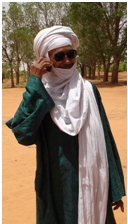You might have a few dollars in your wallet, but chances are most of the money you spend is through your credit or debit card. The cashless system we’ve grown accustomed to across North America, offers consumers instant access to products and services—giving us the freedom to buy whatever we want whenever we want it. Much of the developing world still relies solely on cash and barter transactions.

But now entrepreneurs in Africa are pioneering a remote electronic money network for the continent’s “unbanked” rural people, allowing customers to use their cell phones like a debit card. Investing in this social entrepreneurship could bring prosperity to markets that need it most.
Over the past decade, cell phone use has increased fivefold in Africa. Worldwatch Institute’s Nourishing the Planet project traveled across sub-Saharan Africa over the last year, and has found that nearly everyone, from remote villagers in Ethiopia and Uganda to poor farmers in Niger, has a cell phone.
Farmers are using their phones to gain access to information and other things they didn’t have before. They can check crop prices before investing time in long trips to city markets, for example, giving them the option to wait until prices increase. Agricultural extension agents and development agencies use cell phones to inform farmers about changes in weather that could affect crops.
Thanks to the efforts of companies like Mobile Transactions in Lusaka, Zambia—which Worldwatch highlights in its recently released, State of the World 2011: Innovations that Nourish the Planet—Zambian cotton farmers without bank accounts can now electronically receive payments for their crop direct to their mobile phones. About 80 percent of Zambians, particularly in rural areas, don’t have bank accounts. By using mobile banking, farmers are not only able to get paid more quickly and transparently, but they can also use their mobile accounts to send money transfers, buy phone credit, pay school fees for their children, and order agriculture inputs such as fertilizer and seed. Electronic payments also allow them to build up a credit history over time, which will make getting loans easier in the future.
The cashless system has several benefits. First, money stored electronically is less likely to be stolen or misused. Second, electronic transactions can be instant—lowering transaction costs—whereas in-person cash transactions often mean investing time and money in transportation. Electronic money can benefit more marginalized people who often have to rely on middlemen to help them access markets.
But Mobile Transactions does not have the luxury of riding off of the coattails of highly successful ventures like Twitter and the iPhone. “We’ve faced similar challenges to any start-up of trying to do a lot with a little,” says the company’s CEO, Mike Quinn. “The investment funds are out there, but we are a new business in an emerging industry in a country that few people know much about.”
The investment needed to firmly establish mobile banking in Zambia is large, and even more is needed for it to go international. But the models are there. The technology is there. The expertise is there and growing daily. And according to Quinn, “There is no better place or time to be an entrepreneur in an emerging mobile payments industry.”
Matt Styslinger is a research intern with the Nourishing the Planet project.

Danielle Nierenberg, an expert on livestock and sustainability, currently serves as Project Director of State of World 2011 for the Worldwatch Institute, a Washington, DC-based environmental think tank. Her knowledge of factory farming and its global spread and sustainable agriculture has been cited widely in the New York Times Magazine, the International Herald Tribune, the Washington Post, and
other publications.
Danielle worked for two years as a Peace Corps volunteer in the Dominican Republic. She is currently traveling across Africa looking at innovations that are working to alleviate hunger and poverty and blogging everyday at Worldwatch Institute’s Nourishing the Planet. She has a regular column with the Mail & Guardian, the Kansas City Star, and the Huffington Post and her writing was been featured in newspapers across Africa including the Cape Town Argus, the Zambia Daily Mail, Coast Week (Kenya), and other African publications. She holds an M.S. in agriculture, food, and environment from Tufts University and a B.A. in environmental policy from Monmouth College.








